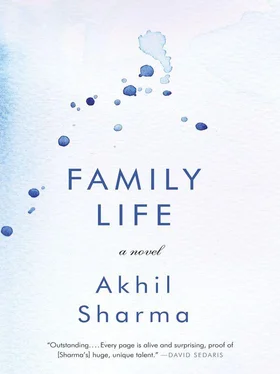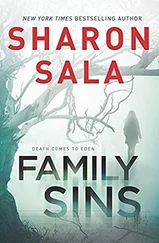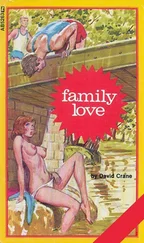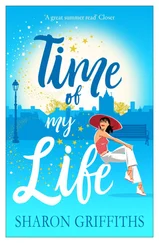“I didn’t believe him. I said, ‘If you’re a ghost, why do you sound like Ajay?’ He said, ‘Since I haven’t been born again, I haven’t committed any sins, and so I have a child’s innocence.’”
“Maybe the ghost was lying.”
“Why would he lie?”
I was quiet for a moment. Birju appeared to have the truth on his side. I asked, “Did the ghost say anything about me?”
“Why should I ask about you? I have my own problems.”
BIRJU SOBBED WHEN his bicycle was taken away. He refused to go downstairs to watch it being put into the back of a truck. Instead, he sat on the living room floor with the heels of his hands pressed into his eyes.
Among the things that remained was my plastic bucket of toys. My mother said that I could just leave it behind in the apartment. The thought of the yellow bucket standing alone in the empty living room, the apartment locked, made me feel guilty, like I would be abandoning it. I decided to give away my toys.
On our last morning in India, I took the bucket with me to the milk shop. When I saw the crowd of boys, shoving and pushing on the sidewalk, I felt embarrassed. I wanted the boys to remember me, and yet in the past, I had tried to make them feel bad.
“Will you take something?” I said, standing on the sidewalk and speaking to a boy whose head was covered in stubble. I took a little car from the bucket and held it out. My voice trembled. “I’m going away and perhaps you would like to have it.”
The boy’s hand struck my palm. As soon as it did, I wanted my car back.
“Would you like something else?” I said, my voice shaking. I put the bucket down and stepped away. The boy bent and hurriedly searched through it. He took out two plastic soldiers, a horse, and a large see-through plastic gun that made a noise and flashed light when the trigger was pulled.
I moved to another boy. I knew this boy was poor since, instead of bringing a milk pail to the shop, he brought a cup.
Soon the bucket was empty. I didn’t know what to do with the bucket. “Will you take it?” I asked the poor boy. He nodded shyly. As I was leaving, the milk man cried, “Remember me in America.”
That night, my mother’s younger brother arrived to take us to the airport.
I used to think that my father had been assigned to us by the government. This was because he appeared to serve no purpose. When he got home in the evening, all he did was sit in his chair in the living room, drink tea, and read the paper. Often he looked angry. By the time we left for America, I knew that the government had not sent him to live with us. Still, I continued to think he served no purpose. Also, I found him frightening.
My father was waiting for us in the arrivals hall at the airport. He was leaning against a metal railing and he appeared angry. I saw him and got anxious.
The apartment my father had rented had one bedroom. It was in a tall, brown-brick building in Queens. The apartment’s gray metal front door swung open into a foyer with a wooden floor. Beyond this was a living room with a reddish brown carpet that went from wall to wall. Other than in the movies, I had never seen a carpet. Birju and my parents walked across the foyer and into the living room. I went to the carpet’s edge and stopped. A brass metal strip held it to the floor. I took a step forward. I felt as if I were stepping onto a painting. I tried not to bring my weight down.
My father took us to the bathroom to show us toilet paper and hot water. While my mother was interested in status, being better educated than others or being considered more proper, my father was just interested in being rich. I think this was because although both of my parents had grown up poor, my father’s childhood had been much more desperate. At some point my grandfather, my father’s father, had begun to believe that thorns were growing out of his palms. He had taken a razor and picked at them till they were shaggy with scraps of skin. Because of my grandfather’s problems, my father had grown up feeling that no matter what he did, people would look down on him. As a result, he cared less about convincing people of his merits and more about just owning things.
The bathroom was narrow. It had a tub, sink, and toilet in a row along one wall. My father reached between Birju and me to turn on the tap. Hot water came shaking and steaming from the faucet. He stepped back and looked at us to gauge our reaction.
I had never seen hot water coming from a tap before. In India, during winter, my mother used to get up early to heat pots of water on the stove so we could bathe. Watching the hot water spill as if water being hot meant nothing, as if there was an endless supply, I had the sense of being in a fairy tale, one of those stories with a jug that is always full of milk or a bag that never empties of food.
During the coming days, the wealth of America kept astonishing me. The television had programming from morning till night. I had never been in an elevator before and when I pressed a button in the elevator and the elevator started moving, I felt powerful that it had to obey me. In our shiny brass mailbox in the lobby, we received ads on colored paper. In India colored paper could be sold to the recycler for more money than newsprint. The sliding glass doors of our apartment building would open when we approached. Each time this happened, I felt that we had been mistaken for somebody important.
Outside our building was a four-lane road. This was usually full of cars, and every few blocks there were traffic lights. In India, the only traffic light I had ever seen was near India Gate. My parents had taken me and Birju for picnics near there, and when they did, we would go look at the light. People were so unused to being directed by a light that a traffic guard in a white uniform and white pith helmet stood underneath, repeating its directions with his hands.
My father, who had seemed pointless in India, had brought us to America, and made us rich. What he had done was undeniable. He now seemed mysterious, like he was a different person, someone who looked like my father but was not the same man.
All the time now my father said things that revealed him as knowledgeable, as someone who could not just be ignored. My mother, Birju, and I had decided that a hot dog was made from dog meat. We had even discussed what part of a dog a hot dog must be made of. We had agreed that it had to be a tail. Then my father came home and heard us and started laughing.
Until we arrived in America, my mother had been the one who made all the decisions about Birju and me. Now I realized that my father, too, had plans for us. This felt both surprising and intrusive, like having my cheeks pinched by a relative I did not know.
He took Birju and me to a library. I had been in two libraries till then. One had had newspapers but not books and was used primarily by people searching employment ads. This had been a small, noisy room next to a barbershop. The other had been on the second floor of a temple, and one had to pay to join. This had had books, but these were kept locked in glass-fronted cabinets.
The library in Queens was bigger than either of the two I had seen. It had several rooms, and they were long, with many metal shelves. The library had thousands of books, and the librarian said we could check out as many as we wanted. At first, I did not believe her.
My father told Birju and me that he would give us fifty cents for each book we read. This bribing struck me as un-Indian and wrong. My mother had told us that Americans were afraid of demanding things from their children. She said this was because American parents did not care about their children and were unwilling to do the hard thing of disciplining them. If my father wanted us to read, what he should have done was threaten to beat us. I wondered whether my father might have become too American during the year that he was living alone. It seemed typical of him to choose to identify with wealthy Americans instead of the propriety of India.
Читать дальше












